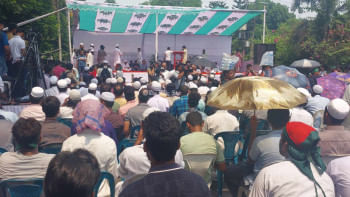‘End facility bias favouring RMG’

The interim government's first task should be to address the disparity in government facilities between readymade garment (RMG) and non-RMG sectors to facilitate export diversification, according to one of the leading exporters of leather shoes.
"Eliminating inequal facilities for the RMG and non-RMG sectors will automatically lead to export diversification," said Nasir Khan, managing director of Jennys Shoes.

In an interview with The Daily Star recently, he said the former government had been all talk and no show over the last 15 years.
It offered unique facilities for the RMG sector while the latter was deprived of many benefits, resulting in poor export diversification, he said.
"We, who are non-RMG goods exporters, have been demanding for a long time to introduce the same rules for both RMG and non-RMG sectors but the government never listened to us. Instead, it gave more priority to the RMG sector," Khan said.
According to him, businesses should need only five licences, as is the case in Vietnam, so that entrepreneurs can run their operations smoothly.
The five licences are certifications for industry, fire safety, environment clearance, export and import.
He added that these licences should remain valid until the companies cease to function.
If the government introduces this system, entrepreneurs will not need to spend time in government offices to renew their licences every year, said Khan.
However, the licence providers must regularly monitor the businesses to ensure their compliance with regulations, he said.
Khan, also vice president of the Leather Goods and Footwear Manufacturers & Exporters Association of Bangladesh, alleged that government entities often harass businesspeople over the smallest of errors to eventually blackmail and extort money from them.
Export-oriented factories need not be monitored very closely as their buyers ensure that they meet certain production standards, he said.
"If they find any faults, they instantly raise questions and postpone their work orders. For this reason, exporters have to strictly maintain compliance with regulations," Khan said.
He pointed out that entrepreneurs currently need to collect 30 licences and 153 documents to set up a business, which was one kind of harassment on its own.
He also alleged that businesspeople face harassment when trying to avail services from government offices and ultimately have to give in to extortion demands.
Officers of the value added tax and customs offices extort entrepreneurs to benefit from their exports even after they meet all the necessary rules and pay all fees, Khan said.
Due to all these irregularities, it is very difficult to keep the price of products competitive in the international market, which is a big obstacle for export diversification, he said.
"Eliminating these problems should be a priority for the interim government and if it can be solved, exports will be diversified," Khan added.
Bangladesh earned around US$1,224 million through the export of leather and leather products in fiscal year 2022-23.

 For all latest news, follow The Daily Star's Google News channel.
For all latest news, follow The Daily Star's Google News channel. 



Comments